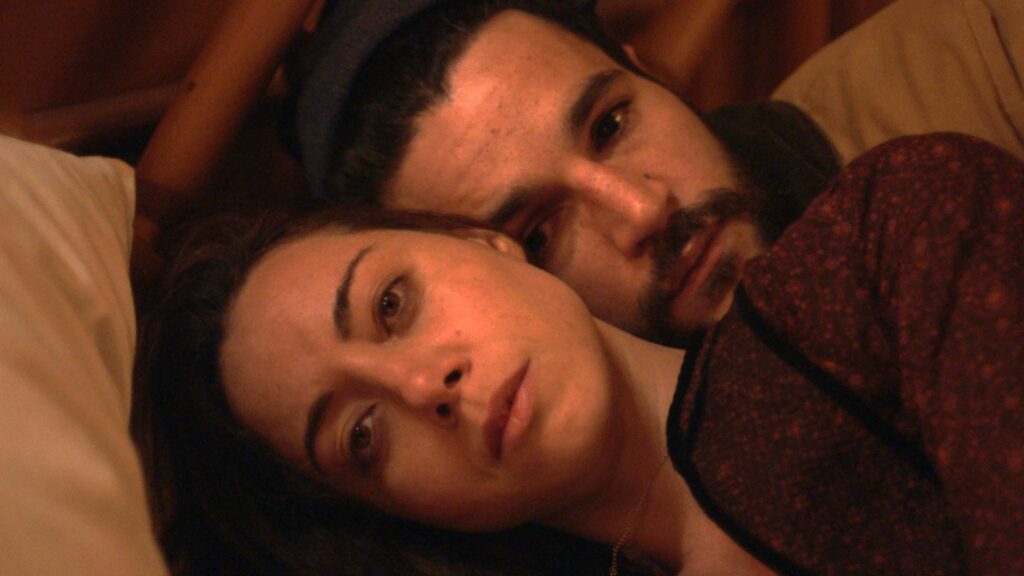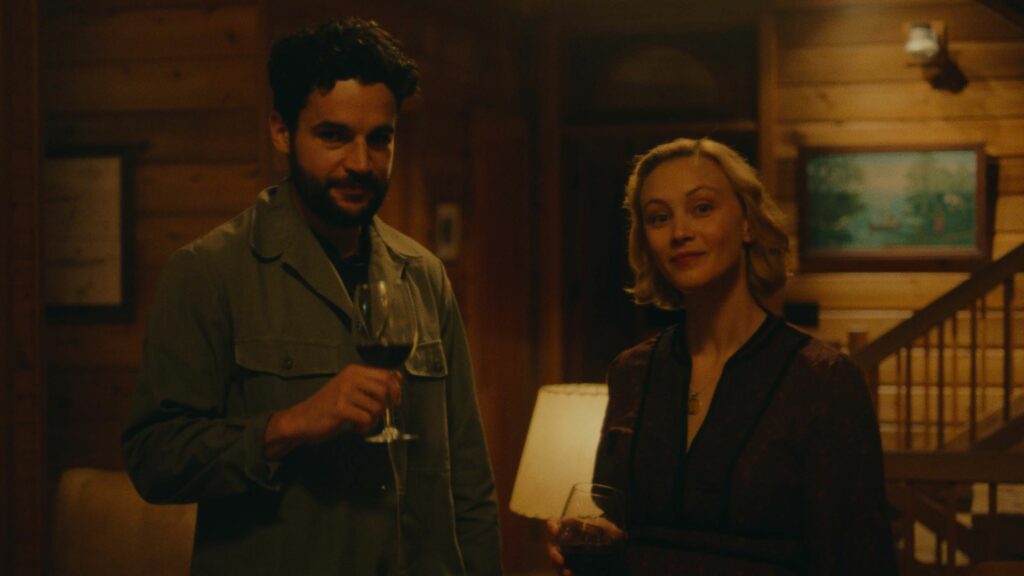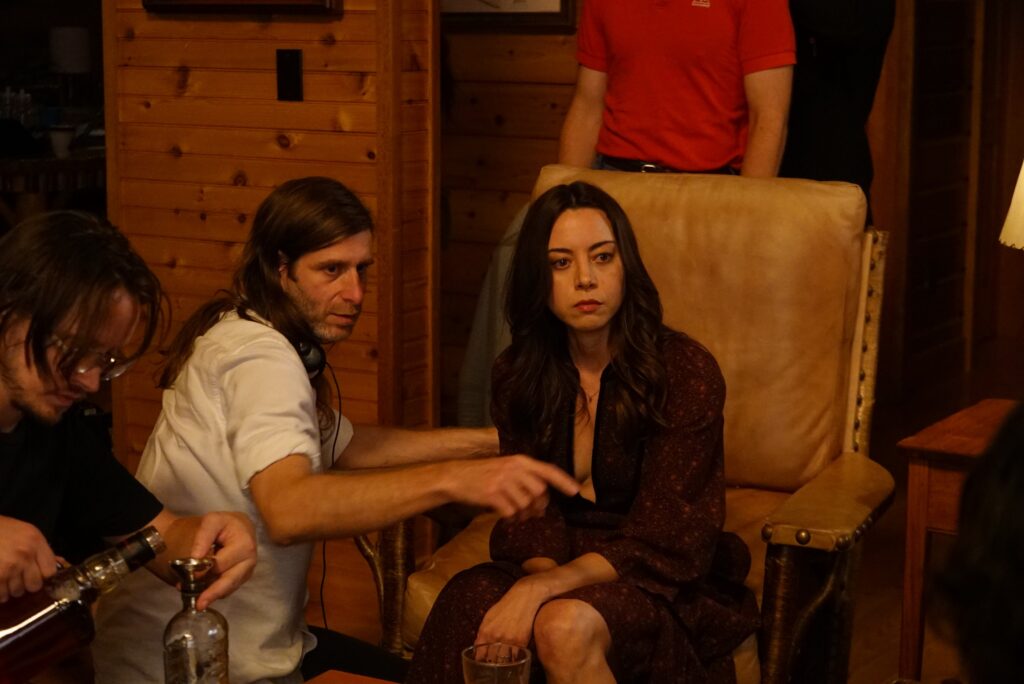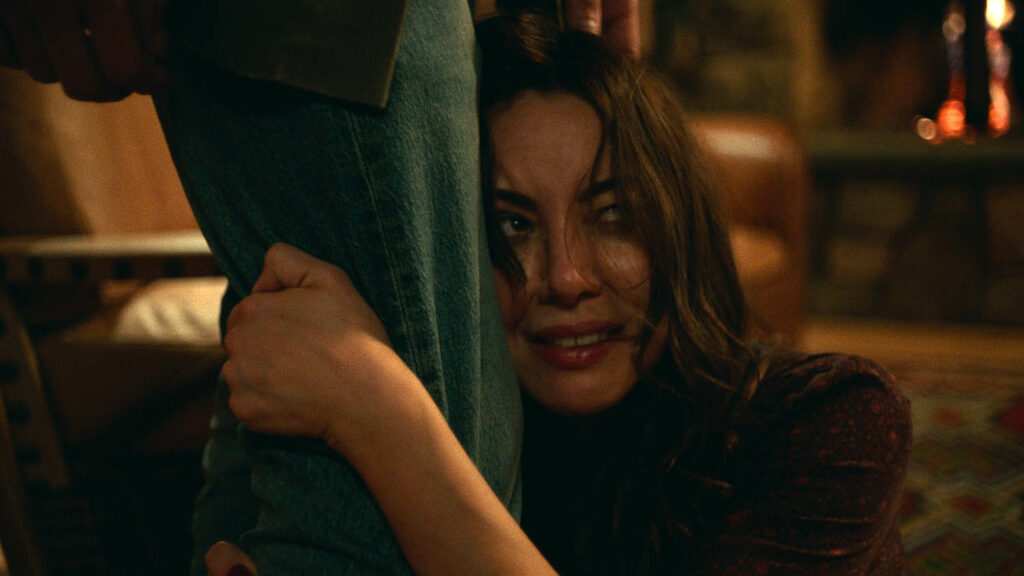Ahead of its April 23rd release, Outtake spoke with Black Bear writer-director Lawrence Michael Levine. Set in a remote lake house amidst the Adirondack Mountains, a young couple hosts an out-of-town guest seeking inspiration for her next movie. The trio quickly fall into a deliberate game of manipulation, goading, desire, and jealousy.
Having premiered at Sundance in 2020 to critical acclaim, Black Bear is a mind-bending, provocative, challenging feature which sees Aubrey Plaza in one of her best performances to date. Also starring Christopher Abbott and Sarah Gadon, Levine’s third directorial effort defies description – and is all the better for it.

Without giving too much away and in your own words, what is Black Bear about?
Lawrence Michael Levine: I think it’s a film about betrayal. And it’s also about the transformation of pain into art; I think as human beings, we have this amazing capability to process negativity and transform it into something beautiful. You see it most obviously in the case of a comedian, where a stand-up comedian takes the pain of life, the unfairness, the hypocrisy, all these things, and turns it into something that makes people happy. The same can be said for a songwriter, for example, and I think that ideally movies should do the same thing. Which is my intention with the movie; describing the plot is kind of boring [laughs]. It’s about a filmmaker who shows up at a B&B and meets some people and strikes up a lustful relationship with the guy who lives there. It’s not much!
It’s hard to describe it and do it justice without spoiling it. Could you talk about what inspired both the content and the structure of this story?
Lawrence Michael Levine: I don’t know exactly. There were a few influences. I think one of the biggest things was that I had been working in film for about 15 years when I started to write this script. I hadn’t made a film in six years and I’d been doing a lot writing in Hollywood, development work with producers and networks, writing pilots, writing scripts for hire, things like that, in order to make a living. And it took about five years, but I finally had some savings and I started thinking, “What’s my next movie going to be?”.
It had been a long time since I had really checked in with myself and asked, what do you want to write? I had spent a long time developing projects that were generated externally, and I think writing the script for this was a way of processing a lot of the experiences that I’d been through. I was also experimenting with a new kind of writing technique, which was from a book called ‘From Where You Dream’. The author suggests that people write by meditating and letting scenes come to them – and I remember having a dream that I think prompted the first half of the film, but I can’t remember the dream itself.

And at the time I was also really interested in dream films, like [Federico] Fellini, [Luis] Buñuel, and Hong Sang-soo who has these interesting, oftentimes bifurcated structures in his films. I was really enjoying these films that had a riveting ambiguity to them. It’s a tough needle to thread, because you don’t want to be so obscure that you lose your audience, but at the same time I didn’t want to make a movie that was conclusive.
All these ideas were knocking around in my mind, but the initial animating idea was that I wanted to tell two stories about betrayal. One in which the protagonist is the betrayer, and one in which the protagonist is the betrayed, to address this fact of life that most of us are not just a victim, and we’re not just a persecutor. I think the two-part structure would be a good way to play with that idea.
So was the two-fold structure part of the initial concept from the start?
Lawrence Michael Levine: It was, that was the simple idea. To have two parts, one in which the protagonist is the one doing the homewrecking, and then have her home wrecked. And then to invite the audience to think about the connection between the two; is one happening because the other happened? Which one?
You’ve mentioned wanting to make a movie where the ending is open-ended, but why was it so important to you?
Lawrence Michael Levine: At the time, the thinking was that your interpretation of life depends on your vantage point. There are no finite interpretations of events, there’s no real or final understanding of our lives and the things that happen to us. Half of the time, we don’t even understand why we do the things we do. I was interested in exploring that and at the time, it felt dishonest to make a movie that wasn’t in that spirit. I don’t think I feel that way today, but I did.

Aubrey Plaza gives a career-best performance in this, and Black Bear is very much an actor’s piece. Could you talk us through the casting process?
Lawrence Michael Levine: Aubrey and I had acted in something together, and I had her in mind when I was writing the script. The character’s persona came from knowing her, her sarcastic, remote, enigmatic presence which I think belied a very tumultuous interior.
The other actors [Christopher Abbott, Sarah Gadon] were people I’d really admired for a long time and wanted to work with. I was really lucky that they did sign on. Plus, when you’re making an inexpensive film, you can’t rely on much besides the performances. I knew when I was writing this that I wanted to keep it simple and inexpensive. So I wrote it for actors.
When you talk about these characters, do you envision an actor’s character in the first and second parts as the same person?
Lawrence Michael Levine: I viewed the protagonist as the same person. The others, I’m less sure about myself. The protagonist, like I said, was someone that I wanted to see on both sides of betrayal. I think the whole movie is taking place in the mind of that protagonist and I think it’s ambiguous how much of that really happened to her. Are these things she’s remembering that now she’s going to write about, and then transform again? Or are these things she’s already transformed? But in my mind, almost everything that’s happening is a part of her – she’s the one writing it, or remembering it, or imagining it.
And with so much ambiguity at play, did your actors ever ask for explanations as to what was happening? Or were they happy to just go with what was on the page?
Lawrence Michael Levine: We didn’t have any time to rehearse, so all the preparation we did was going through the script together. I listened to their thoughts, concerns, and comments, and I did invite them to change any lines that they felt wouldn’t sound right coming out of their mouths. I wouldn’t say anything substantial changed, but they did feel free to share ideas with me, and a lot of time we used them.

For example, when Allison [Plaza] has her big breakdown and throws up when the scene is completed, the boom operator asks for room tone – which is something you have to do on a set to get the tone of the room to lay under the dialogue. But originally, I didn’t have that moment. That was Aubrey’s idea, and I thought it was great, so we put it in the movie.
But it seemed like they all understood the script really well. There was no need to discuss things like what’s real, what isn’t real. I don’t think actors care about that stuff, they care about what they’re doing in the scene. Like, what’s motivating them? What’s the tactic they’re using to achieve their objective? Actors have practical concerns, and they usually understand scripts pretty well.
You’ve mentioned a few things such as putting all your savings into this project, which draws parallels with Gabe’s [Abbott] filmmaking and his concerns. Then you have the relationship between Allison and Gabe which is between two creatives, much like yourself and your wife [Sophia Takal]. How much of this project do you consider to be autobiographical?
Lawrence Michael Levine: Oh, that’s interesting. I don’t think that any of it is autobiographical in any direct way. At the same time, I don’t think that I would have been able to write that movie without having the experiences I’ve had of working with my wife on so many projects. I guess there are certain aspects that are autobiographical, but they’re diffuse. For example, I have put money into my own movies, and it has been a source of tension in my own marriage. I guess that’s autobiographical. I’ve definitely been on sets where I was worried about time, on this movie more than any other. I’ve had a nervous stomach so when I’m stressed out, it gets worse, which is something you see in Cahya [Paola Lázaro]. I’ve definitely been betrayed, so that’s autobiographical in a sense… I’d say there are parallels, but I wouldn’t say that this is a memoir or anything like that.

Another interesting feature of the film is the recurring image of the titular black bear. It reappears in different functions, and there’s even an instance when Allison calls Gabe “bear”, which makes you question what the bear represents. Did you have an answer to that when you wrote the script?
Lawrence Michael Levine: I don’t remember exactly. I wrote part one first, and part two ended up being based on an outline I had written a decade prior, but I didn’t know that that’s what I was going to do at the time. When I wrote part one, I don’t think that I knew where it was going. I had these characters, and I had a situation, but I didn’t know how it was going to resolve. And as I was writing I came up with the idea that they could get into a car crash as the resolution of this story. I started to think about what could make them swerve off the road on a dark path in the middle of the night. It could be a skunk, but that wouldn’t be the right vibe.
There are black bears in those woods, so maybe I should use that. So I put in the black bear. It was more pragmatic than symbolic at first, but later did think that the bear is actually a really interesting symbol for this film. Because of its hibernation pattern, the black bear represents life, death, and rebirth. And it’s also symbolic of the dark forces of nature, and they can represent our repressed animal natures. I started to think all these things and even if the bear was originally a pragmatic element, it was resonant with the themes that I wanted to explore. And so, as I was writing the second part, I wove in the bear imagery, knowing that I was going to build to a second confrontation with the bear that would be different.
Opposites really, since the first encounter with the bear results in death, and in the second half it’s an opportunity for rebirth for Allison’s character.
Lawrence Michael Levine: Exactly! Exactly that.
Black Bear releases on digital April 23rd.
